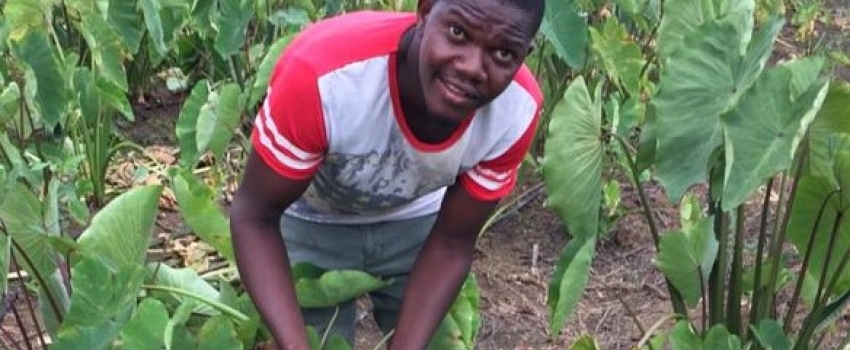You are here
Home | Dasheen farmer says youth involvement in agriculture critical to economic recovery post COVID-19

Dasheen farmer, Damion Kerr, displays dasheen reaped at his farm at the Ebony Park Agro-Park in Clarendon on September 10.
For 30-year-old dasheen farmer, Damion Kerr, more youth involvement in agriculture will be critical for Jamaica’s economic recovery in a post COVID-19 environment.
“If more young people get into agriculture it will be better for our society because this will result in even more increased agricultural production. Agriculture has also become more modern and the youth are interested in utilizing technology,” he said.
Mr Kerr hails from the parish of Clarendon and lives about a mile away from his acre-and-a-half farm, which is located at the Ebony Park Agro-Park.
He is one of 230 farmers across the island involved in the growing of dasheen under the Ministry of Industry, Commerce, Agriculture and Fisheries’ Production Incentive Programme (PIP). This is being implemented by the Rural Agricultural Development Authority (RADA).
Other parishes in which dasheen are being grown is Trelawny, St. James, Hanover, Westmoreland, St. Elizabeth, Portland and St. Elizabeth.
Mr. Kerr, who has been growing dasheen, otherwise known as taro or coco, for two years enjoys it and finds it a less difficult crop to grow.
“Although I have been affected by pests such as the white flies and other pests that affect the taro, I have chemicals that I use to control the pests so I don’t have problems with it so much… I have to manage the dasheen so that it can produce the tubers,” he said.
He added that once one adheres to the proper management process of the dasheen then there is no need for worry. His efforts have so far yielded 12 tonnes of the starchy root vegetable.
He also credited his success with the tuber to the support he has received from RADA in the form of technical expertise, training in the application of chemicals, planting material and continued monitoring.
Outside of dasheen farming, Mr. Kerr grows sweet potatoes, sweet peppers and okras.
The young Clarendon farmer acknowledges that while his employment of staff varies, he has two permanent employees who assist him with the day-to-day operations. He also employs 10 additional persons when it is time to harvest his sweet peppers.
For the future, the search is on for an additional four acres of land to support his plans to increase production.
During the 2019/20 dasheen crop year under the Production Incentive Programme, dasheen recorded a four per cent increase in production
RADA is encouraging farmers to increase their production and is expecting a yield of roughly 378 tonnes of dasheen for the 2020/21 crop.
Under the PIP, some $1.6 billion is being expended on increasing production of crops such as dasheen, ginger, hot peppers, Irish potatoes, onion, sweet yam, strawberry and cassava in support of the country’s efforts to achieve food security. Over 4,000 farmers are expected to benefit from the programme, directly and indirectly.
Farmers involved in the programme have received technical assistance through RADA through meetings and field demonstrations as well as planting materials, agricultural chemicals such as insecticides and fungicides, plastic mulch, irrigation and spraying equipment.
|
|
|
Hope Gardens, Kingston 6, Jamaica
Opening hours:
Mondays - Thursdays 8:30 a.m. - 5:00 p.m.
Fridays 8:30 a.m. - 4:00 p.m.
MoAFM Customer Feedback System: https://www.moa.gov.jm/customer-feedback
|